![]()
![]()
![]()
Use LEFT and RIGHT arrow keys to navigate between flashcards;
Use UP and DOWN arrow keys to flip the card;
H to show hint;
A reads text to speech;
126 Cards in this Set
- Front
- Back
- 3rd side (hint)
|
Filler |
Filler |
|
|
|
Filler |
Filler |
|
|
|
Filler |
Filler |
|
|
|
Vocab Word
|
Definition |
|
|
|
Articles of Confederation
|
first constitution of the 13 states, created in 1781 and changed in 1789 by the Constitution of the United States.
|
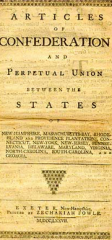
|
|
|
ratification
|
to change into |
|
|
|
levy
|
tax |
|
|
|
Founders (or Framers)
|
work on farms with crops and animals |
|
|
|
Virginia Plan
|
a plan, unsuccessfully proposed at the Constitutional Convention, providing for a legislature of two houses with proportional representation in each house and executive and judicial branches to be chosen by the legislature. |
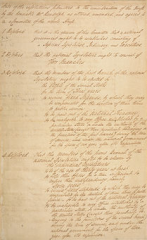
|
|
|
New Jersey Plan
|
a plan, unsuccessfully proposed at the Constitutional Convention,providing for a single legislative house with equal representation foreach state. |
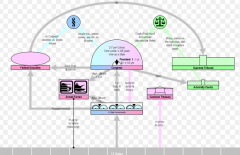
|
|
|
Great Compromise |
bad time |

|
|
|
Three-Fifths Compromise
|
three fiths of peple werent slaves |
|
|
|
Executive Branch
|
enforcement of laws |

|
|
|
Judicial Branch
|
interprets laws |

|
|
|
Legislative Branch
|
makes laws |

|
|
|
Checks & Balances |
ability of each branch to exercise checks or control over other branches
|

|
|
|
Antifederalists
|
people who opposed ratifactions of the constitution
|

|
|
|
Federalists
|
people who suport ratification of the constitution |

|
|
|
Federalism
|
system of government in wich power is shared between the national government and states |
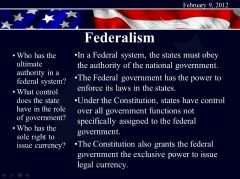
|
|
|
majority rule
|
most people or states vote for somthing but not all |

|
|
|
amendment |
addition to a document |

|
|
|
Bill of Rights |
first ten ammendments to the us constitution |

|
|
|
House of Representatives
|
the lower legislative branch in many national and state bicameral governing bodies, as in the United States, Mexico, and Japan. |

|
|
|
Senate |
an assembly or council of citizens having the highest deliberative functions in a government, especially a legislative assembly of a state or nation. |

|
|
|
Congress |
this body as it exists for a period of two years during which it has the same membership:
|

|
|
|
Popular Sovereignty |
the doctrine that sovereign power is vested in the people and that those chosen to govern, as trustees of such power, must exercise it in conformity with the general will. |

|
|
|
Republicanism |
principles or adherence to them.
|

|
|
|
separation of powers |
the principle or system of vesting in separate branches the executive, legislative, and judicial powers of a government. |
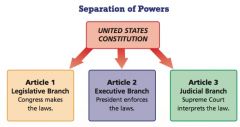
|
|
|
limited government |
confined within limits; restricted or circumscribed: |
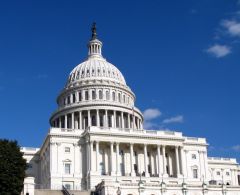
|
|
|
bicameralism |
having two branches, chambers, or houses, as a legislative body. |

|
|
|
judicial review |
the power of a court to adjudicate the constitutionality of the laws of a government or the acts of a government official. |

|
|
|
impeachment
|
demonstration that a witness is less worthy of beliefx |

|
|
|
quorum |
the number of members of a group or organization required to be present to transact business legally, usually a majority |

|
|
|
revenue |
the government department charged with the collection of such income. |

|
|
|
veto
|
not agree with |

|
|
|
naturalization |
adherence or attachment to what is natural. |
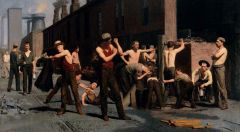
|
|
|
elastic clause
|
a statement in the U.S. Constitution (Article I, Section 8) granting Congress the power to passall laws necessary and proper for carrying out the enumerated list of powers. |

|
|
|
natural born citizen
|
born in united states |

|
|
|
electoral college
|
a body of electors chosen by the voters in each state to elect the president and vice president of the us |

|
|
|
Supreme Court
|
the highest court of the U.S. |

|
|
|
suffrage
|
the right to vote, especially in a political election.
|

|
|
|
due process of law
|
the regular administration of the law
|
|
|
|
bail
|
the state of release upon being bailed.
|
|
|
|
Constitution
|
the system of fundamental principles according to which a nation, state, corporation, or the like,is govern
|
|
|
|
Vocab Word
|
Definition
|
|
|
|
Articles of Confederation
|
first constitution of the 13 states, created in 1781 and changed in 1789 by the Constitution of the United States.
|
|
|
|
ratification
|
to change into
|
|
|
|
levy
|
tax
|
|
|
|
Founders (or Framers)
|
work on farms with crops and animals
|
|
|
|
Virginia Plan
|
a plan, unsuccessfully proposed at the Constitutional Convention, providing for a legislature of two houses with proportional representation in each house and executive and judicial branches to be chosen by the legislature.
|
|
|
|
New Jersey Plan |
a plan, unsuccessfully proposed at the Constitutional Convention,providing for a single legislative house with equal representation foreach state.
|
|
|
|
Great Compromise
|
bad time
|
|
|
|
Three-Fifths Compromise
|
three fiths of peple werent slaves
|
|
|
|
Executive Branch
|
enforcement of laws
|
|
|
|
Judicial Branch
|
interprets laws
|
|
|
|
Legislative Branch
|
makes laws |
|
|
|
Checks & Balances
|
ability of each branch to exercise checks or control over other branches
|
|
|
|
Antifederalists
|
people who opposed ratifactions of the constitution
|
|
|
|
Federalists
|
people who suport ratification of the constitution
|
|
|
|
Federalism
|
system of government in wich power is shared between the national government and states
|
|
|
|
majority rule
|
most people or states vote for somthing but not all
|
|
|
|
amendment
|
addition to a document
|
|
|
|
Bill of Rights
|
first ten ammendments to the us constitution
|
|
|
|
House of Representatives
|
the lower legislative branch in many national and state bicameral governing bodies, as in the United States, Mexico, and Japan.
|
|
|
|
Senate
|
an assembly or council of citizens having the highest deliberative functions in a government, especially a legislative assembly of a state or nation.
|
|
|
|
Congress
|
this body as it exists for a period of two years during which it has the same membership:
|
|
|
|
Popular Sovereignty
|
the doctrine that sovereign power is vested in the people and that those chosen to govern, as trustees of such power, must exercise it in conformity with the general will.
|
|
|
|
Republicanism
|
principles or adherence to them.
|
|
|
|
separation of powers
|
the principle or system of vesting in separate branches the executive, legislative, and judicial powers of a government.
|
|
|
|
limited government
|
confined within limits; restricted or circumscribed:
|
|
|
|
bicameralism
|
having two branches, chambers, or houses, as a legislative body.
|
|
|
|
judicial review
|
the power of a court to adjudicate the constitutionality of the laws of a government or the acts of a government official.
|
|
|
|
impeachment
|
demonstration that a witness is less worthy of beliefx
|
|
|
|
quorum
|
the number of members of a group or organization required to be present to transact business legally, usually a majority
|
|
|
|
revenue
|
the government department charged with the collection of such income.
|
|
|
|
veto
|
not agree with
|
|
|
|
naturalization
|
adherence or attachment to what is natural.
|
|
|
|
elastic clause
|
a statement in the U.S. Constitution (Article I, Section 8) granting Congress the power to passall laws necessary and proper for carrying out the enumerated list of powers.
|
|
|
|
natural born citizen
|
Born in the USA |
|
|
|
electoral college
|
a body of electors chosen by the voters in each state to elect the president and vice president of the us |
|
|
|
Supreme Court
|
the highest court of the U.S. |
|
|
|
suffrage
|
the right to vote, especially in a political election. |
|
|
|
due process of law
|
the regular administration of the law |
|
|
|
bail |
the state of release upon being bailed.
|
|
|
|
Constitution
|
the system of fundamental principles according to which a nation, state, corporation, or the like,is govern |
|
|
|
Vocab Word |
Definition
|
|
|
|
Articles of Confederation
|
first constitution of the 13 states, created in 1781 and changed in 1789 by the Constitution of the United States.
|
|
|
|
ratification
|
to change into
|
|
|
|
levy
|
tax
|
|
|
|
Founders (or Framers)
|
work on farms with crops and animals
|
|
|
|
Virginia Plan
|
a plan, unsuccessfully proposed at the Constitutional Convention, providing for a legislature of two houses with proportional representation in each house and executive and judicial branches to be chosen by the legislature.
|
|
|
|
New Jersey Plan
|
a plan, unsuccessfully proposed at the Constitutional Convention,providing for a single legislative house with equal representation foreach state.
|
|
|
|
Great Compromise
|
bad time
|
|
|
|
Three-Fifths Compromise
|
three fiths of peple werent slaves
|
|
|
|
Executive Branch
|
enforcement of laws
|
|
|
|
Judicial Branch
|
interprets laws
|
|
|
|
Legislative Branch
|
makes laws
|
|
|
|
Checks & Balances
|
ability of each branch to exercise checks or control over other branches
|
|
|
|
Antifederalists
|
people who opposed ratifactions of the constitution
|
|
|
|
Federalists
|
people who suport ratification of the constitution
|
|
|
|
Federalism
|
system of government in wich power is shared between the national government and states
|
|
|
|
majority rule
|
most people or states vote for somthing but not all
|
|
|
|
amendment
|
addition to a document
|
|
|
|
Bill of Rights
|
first ten ammendments to the us constitution
|
|
|
|
House of Representatives
|
the lower legislative branch in many national and state bicameral governing bodies, as in the United States, Mexico, and Japan.
|
|
|
|
Senate
|
an assembly or council of citizens having the highest deliberative functions in a government, especially a legislative assembly of a state or nation.
|
|
|
|
Congress
|
this body as it exists for a period of two years during which it has the same membership:
|
|
|
|
Popular Sovereignty
|
the doctrine that sovereign power is vested in the people and that those chosen to govern, as trustees of such power, must exercise it in conformity with the general will. |
|
|
|
Republicanism
|
principles or adherence to them.
|
|
|
|
separation of powers
|
the principle or system of vesting in separate branches the executive, legislative, and judicial powers of a government.
|
|
|
|
limited government
|
confined within limits; restricted or circumscribed:
|
|
|
|
bicameralism
|
having two branches, chambers, or houses, as a legislative body.
|
|
|
|
judicial review
|
the power of a court to adjudicate the constitutionality of the laws of a government or the acts of a government official.
|
|
|
|
impeachment
|
demonstration that a witness is less worthy of beliefx
|
|
|
|
quorum
|
the number of members of a group or organization required to be present to transact business legally, usually a majority
|
|
|
|
revenue
|
the government department charged with the collection of such income.
|
|
|
|
veto
|
not agree with
|
|
|
|
naturalization
|
adherence or attachment to what is natural.
|
|
|
|
elastic clause
|
a statement in the U.S. Constitution (Article I, Section 8) granting Congress the power to passall laws necessary and proper for carrying out the enumerated list of powers.
|
|
|
|
natural born citizen
|
Born in the USA |
|
|
|
electoral college
|
a body of electors chosen by the voters in each state to elect the president and vice president of the us |
|
|
|
Supreme Court
|
the highest court of the U.S.
|
|
|
|
suffrage
|
the right to vote, especially in a political election.
|
|
|
|
due process of law
|
the regular administration of the law
|
|
|
|
bail
|
the state of release upon being bailed.
|
|
|
|
Constitution |
the system of fundamental principles according to which a nation, state, corporation, or the like,is govern
|
|

